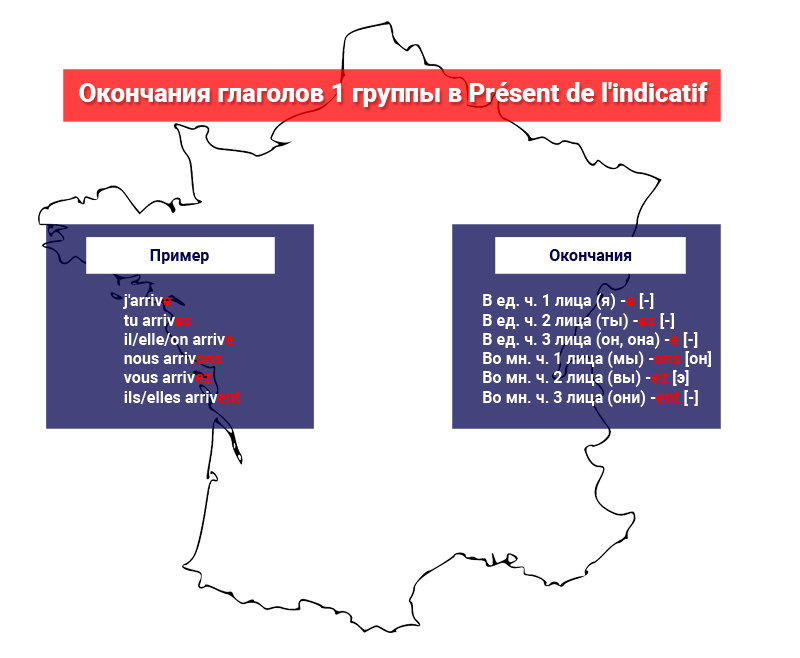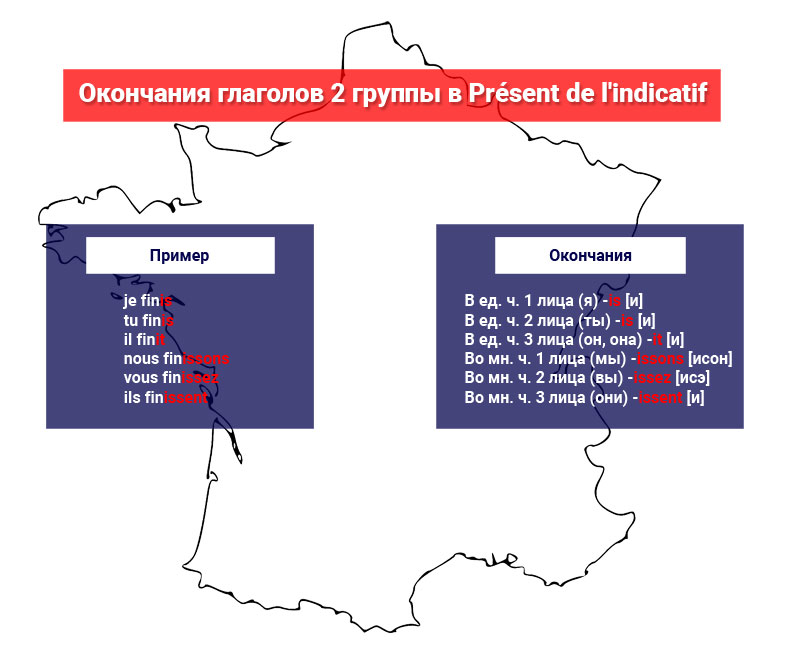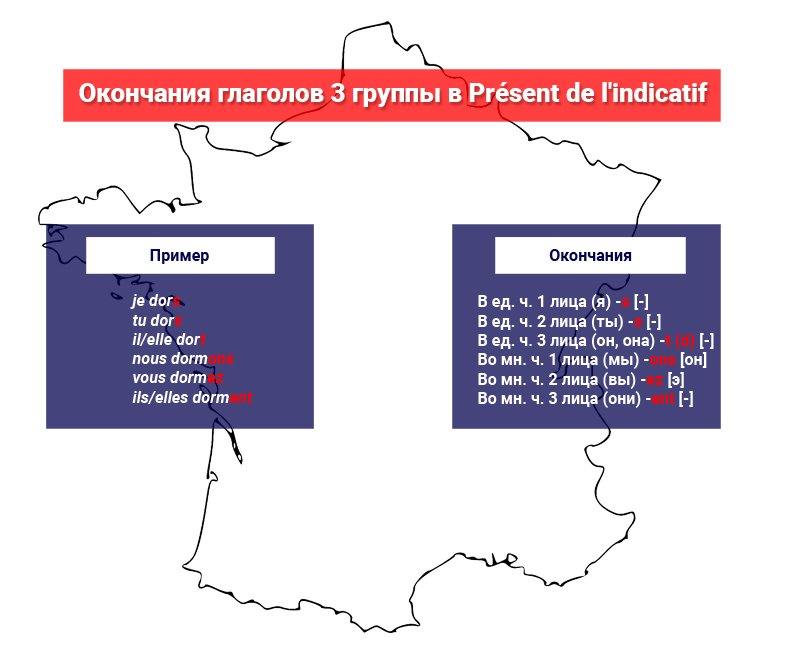На чтение 3 мин. Опубликовано 21.02.2020
Это время используется, когда речь идет о событии, происходящем прямо сейчас, в данный отрезок времени. Чтобы образовать его, нужно к основе глагола присоединить правильное окончание. У первой и второй групп (т.е. правильных) она образуется просто – нужно убрать окончание у инфинитива (-er, -ir). С неправильными глаголами третьей группы всё несколько сложнее, их основы нужно просто запоминать и у разных лиц и чисел они могут отличаться.
Содержание
- Глаголы первой группы (окончание -er)
- Глаголы второй группы (окончание -ir)
- Глаголы третьей группы (окончания -re, -ir, -oir) + aller
Глаголы первой группы (окончание -er)
Возьмем для примера aimer — любить и проспрягаем его в настоящем времени.
|
Лицо |
Ед. число |
Мн. число |
Употребление |
|
1 |
-e |
-ons |
j’aime — я люблю nous aimons— мы любим |
|
2 |
-es |
-ez |
tu aimes — ты любишь vous aimez — вы любите |
|
3 |
-e |
-ent |
il/elle aime — он/она любит ils/elles aiment — они любят |
Есть несколько особенностей спряжения:
- Глаголы, которые заканчиваются на -cer, изменяют букву с на ç, но только в том случае, если окончание начинается на -a и -o. Например, commançons – начинаем.
- Если глагол заканчивается на -ger, то между основой и окончанием появляется буква e (для сохранения правильного произношения). Это правило действует в том случае, если первая буква окончания -a или -o. Например, mangeons – едим.
Если и другие особенности спряжения у первой группы, вы можете посмотреть их в статье об этих глаголах на сайте.
Глаголы второй группы (окончание -ir)
Разберем на примере finir — заканчивать.
|
Лицо |
Ед. число |
Мн. число |
Употребление |
|
1 |
-is |
-issons |
je finis — я заканчиваю nous finissons — мы заканчиваем |
|
2 |
-is |
-issez |
tu finis — ты заканчиваешь vous finissez — вы заканчиваете |
|
3 |
-it |
-issent |
il/elle finit — он/она заканчивает ils/elles finissent — они заканчивают |
Как вы видите, в настоящем времени эти глаголы имеют одну особенность — перед окончанием обязательно ставится суффикс -iss.
Глаголы третьей группы (окончания -re, -ir, -oir) + aller
Рассмотрим на примере dormir — спать.
|
Лицо |
Ед. число |
Мн. число |
Употребление |
|
1 |
-s |
-ons |
je dors — я сплю nous dormons — мы спим |
|
2 |
-s |
-ez |
tu dors — ты спишь vous dormez — вы спите |
|
3 |
-t (d) |
-ent |
il/elle dort — он/она спит ils/elles dorment — они спят |
Как видите, основы у ед.ч. и мн.ч. отличаются. Некоторые глаголы, например, один из самых неправильных – aller, имеют совсем особые формы при спряжении в Présent: je vais, il va, tu vas, ils vont, но nous allons, vous allez.
Читайте статьи с таблицами спряжения следующих глаголов третьей группы во всех временах, наклонениях, а также в вопросительной и отрицательной форме:
- aller
- apprendre
- avoir
- connaitre
- dire
- dormir
- être
- faire
- mettre
- partir
- prendre
- savoir
- venir
- voir
- vouloir
Рекомендуем скачать упражнения с ключами к ним в формате PDF по ссылке, для закрепления пройденного материала о настоящем времени во французском языке.
Перейти к содержимому
Présent (настоящее время) служит для выражения действия, происходящего в настоящее время. Образуется от основы глаголы (т.е. без окончания инфинитива!!!) в неопределенной форме и следующих окончаний:
Как определить группу глагола?
| Лицо | Единственное число | Множественное число | ||
| Глаголы I группы (-er в неопр. форме) | Глаголы II группы (-ir в неопр. форме) | Глаголы III группы | I, II, III группы | |
| 1 | -e | -is | -s/-x | -ons |
| 2 | -es | -is | -s/-x | -ez / -es |
| 3 | -e | -it | -t / -d | -ent |
| Примечание: у глаголов II группы во множественном числе перед окончанием появляется суффикс —iss |
| Образец спряжения глагола I группы в présent — parler Je parleTu parles Il, elle, on parle Nous parlons Vous parlez Ils, elles parlent Глаголы 1 группы, заканчивающиеся на —cer, перед окончаниями, которые начинаются на —a и —o, меняют с на ç: nous commençons. У глаголов, заканчивающихся на —ger, перед окончаниями, которые начинаются на —a и —o, появляется буква e: nous mangeons. Подробнее об особых правилах спряжения глаголов 1 группы |
Образец спряжения глагола II группы в présent — finir Je finisTu finis Il, elle, on finit Nous finissons Vous finissez Ils, elles finissent |
Упражнения на спряжение глаголов 1 группы
Упражнение 1
Упражнение 2
Упражнения на спряжение глаголов 2 группы
Упражнение 1
Упражнение 2
Упражнение 3
Упражнение 4
Just here for the exercises? Click here.
What is le présent?
The present tense in French grammar (le présent) corresponds to the English simple present. It talks about facts, current situations and repeated actions in the present, as well as scheduled future actions. To conjugate a verb in the French present tense, we add specific endings to the infinitive of the verb depending on whether it ends in -er, -ir or -re.
Learn all about le présent in French grammar with Lingolia’s quick and easy examples, then put your knowledge to the test in the exercises.
Example
Le garçon s’appelle Félix. Tous les mardis, il va à l’entraînement de football. Il joue au football depuis cinq ans.
Mardi prochain à 14 heures, son équipe a un match important.
When to use le présent
We use the French present tense to express:
- facts and ongoing situations in the present
- Example:
- Le garçon s’appelle Félix.The boy is called Félix.
- actions that happen once, multiple times or never in the present
- Example:
- Tous les mardis, il va à l’entraînement de football.He goes to football training every Tuesday..
- a future action that is already planned or agreed upon (requires a specific future time indicator)
- Example:
- Mardi prochain à 14 heures, son équipe a un match important.His team has an important match next Tuesday at 2 o’clock.
- the duration of actions that started in the past and are ongoing in the present.
Note: French uses the present tense to express this idea, but English talks about duration using the present perfect simple or continuous tenses.
- Example:
- Il joue au football depuis cinq ans.He’s been playing football for five years..
- here il joue = he’s been playing or he’s played
How to conjugate the present tense in French
To conjugate French verbs in the present tense, we remove the infinitive ending (-er, -ir or -re) and add the following endings:
-er Verbs
The table below shows the present tense conjugation of -er verbs:
Spelling Rules and Exceptions
- For verbs ending in -ger, we add an e before the letter o in the nous form in order to preserve the pronunciation of the g.
- Example:
- mangereat — je mange, tu manges, il/elle/on mange, nous mangeons, vous mangez, ils/elles mangent
- For verbs ending in —cer, the c becomes ç before the letter o in the nous form in order to preserve pronunciation.
- Example:
- lancerthrow — je lance, tu lances, il/elle/on lance, nous lançons, vous lancez, ils/elles lancent
- For verbs ending in -yer, the y becomes an i in the singular forms as well as in the 3rd person plural. (For verbs ending in —ayer, we can write either i or y.)
- Examples:
- envoyersend — j’envoie, tu envoies, il envoie, nous envoyons, vous envoyez, ils/elles envoient
- payerpay — je paye/paie
- For many verbs that end in —eler or —eter, the final consonant is doubled before a silent e.
(Exceptions: acheterbuy, décelerdiscover, gelerfreeze, haleterpant, harcelerharass, modelermodel, pelerpeel)
- Examples:
- jeterthrow away – il jette
- appelercall – il appelle
- (but: acheter — j’achète)
- If the final syllable of the word stem contains an e or é, we give it a grave accent (accent grave) in its conjugated forms (apart from the 1st and 2nd person plural).
- Example:
- peserweigh — je pèse, tu pèses, il/elle/on pèse, nous pesons, vous pesez, ils/elles pèsent
- acheterbuy — j’achète, tu achètes, il/elle/on achète, nous achetons, vous achetez, ils/elles achètent
- cédergive in — je cède, tu cèdes, il/elle/on cède, nous cédons, vous cédez, ils/elles cèdent
- Remember: the verb aller is irregular.
- Example:
- allergo — je vais, tu vas, il/elle/on va, nous allons, vous allez, ils/elles vont
Type 1 -ir Verbs
The majority of -ir verbs belong to type 1, which means that the plural forms add -iss- before the present tense endings:
Many common verbs are conjugated in this way: applaudirapplaud, choisirchoose, divertiramuse, fleurirbloom, grandirgrow, grossirput on weight, guérircure, haïrhate, maigrirlose weight, nourrirnourish/feed, obéirobey, pâlirgo pale, punirpunish, ralentirslow down, remplir(re)fill, réjouircelebrate, réunirmeet, réussirsucceed, rougirblush, saisirgrasp, vieillirto age, etc.
Type 2 -ir Verbs
Type 2 -ir verbs can be divided into two kinds: verbs that are conjugated in the same way as -er verbs, and verbs that are conjugated with -s/-s/-t in the singular forms
*Other verbs that follow the same conjugation include: accueillirwelcome, couvrircover, cueillirgather, découvrirdiscover, ouvriropen, souffrirsuffer, etc.
**Other verbs that follow the same conjugation include: courirrun, fuirrun away, mentirlie, partirleave, sentirfeel, servirserve, sortirgo out, etc.
Note: the verbs venir and tenir are completely irregular.
- Examples:
- venircome — je viens, tu viens, il/elle/on vient, nous venons, vous venez, ils/elles viennent
- tenirhold — je tiens, tu tiens, il/elle/on tient, nous tenons, vous tenez, ils/elles tiennent
-re Verbs
Regular -re verbs are conjugated as follows:
* The following verbs are conjugated in the same way as construire: conduiredrive, cuirecook, déduirededuce, détruiredestroy, instruireinstruct, introduireintroduce, nuireharm, produireproduce, reproduirereproduce, réduirereduce, séduireseduce, traduiretranslate.
** The following verbs are conjugated in the same way as vivre: suivrefollow, poursuivrechase, revivrerelive, survivresurvive.
Spelling Rules & Exceptions
- Verbs ending in -aître (traditional spelling) or -aitre (official spelling since 1990) such as connaître/connaitreknow, paraître/paraitreappear, naître/naitrebe born and their variations such as reconnaître/reconnaitrerecognise, disparaître/disparaitredisappear, renaître/renaitrebe reborn are conjugated as follows:
- Example:
- connaîtreknow – je connais, tu connais, il/elle/on connaît, nous connaissons, vous connaissez, ils/elles connaissent
-
Many verbs that end in -ire (boiredrink, croirebelieve, diresay, écrirewrite, fairedo/make, lireread, plaireplease, rirelaugh …) are irregular and change their stem in the plural forms. There is no general rule to learn the conjugations of these verbs, it’s best to learn them by heart.
- Examples:
- boiredrink — je bois, tu bois, il/elle/on boit, nous buvons, vous buvez, ils/elles boivent
- croirebelieve — je crois, tu crois, il/elle/on croit, nous croyons, vous croyez, ils/elles croient
- écrirewrite — j’écris, tu écris, il/elle/on écrit, nous écrivons, vous écrivez, ils/elles écrivent
- lireread — je lis, tu lis, il/elle/on lit, nous lisons, vous lisez, ils/elles lisent
Verbs that end in -dre and -tre
Exceptions
-
The verb prendretake and its related forms apprendrelearn, comprendreunderstand, surprendresurprise, etc. lose the d in their plural forms.
In addition, the n is doubled in the ils/elles form.- Example:
- prendretake – je prends, tu prends, il/elle/on prend, nous prenons, vous prenez, ils/elles prennent.
-
Verbs that end in -indre (atteindrewait, craindrefear, éteindreturn off, joindrecombine, peindrepaint, plaindrepity, teindredye …) lose the d in the singular and plural forms.
In addition, we transform the n to gn in the plural forms.- Example:
- peindrepaint – je peins, tu peins, il/elle/on peint, nous peignons, vous peignez, ils/elles peignent
-oir Verbs
Verbs that end in —oir such as recevoirreceive, apercevoirglimpse, concevoirdesign, décevoirdisappoint, percevoirperceive are conjugated as follows:
Note: the verbs avoirhave, devoirmust, mouvoirmove, pouvoirbe able to, savoirknow, voirsee und vouloirwant are irregular and are not conjugated in the same way as recevoir. Check out their conjugations on our page on irregular verbs in French and practise in the exercises.
Important Irregular Verbs: avoir, être, aller and faire
Le présent continu: the present progressive in French
The présent continu, also known as the présent progressif or the présent duratif, is the French equivalent of the present progressive in English (I am doing, he is going, etc.). Like its English counterpart, it demonstrates that an action or event is in progress at the moment of speaking.
The présent continu is formed as follows:
present tense conjugation of être + en train de + infinitive
- Examples:
- Nous sommes en train de dîner.We’re having dinner.
- Les joueurs sont en train de perdre le match.The players are losing the match.
- Je suis en train de repeindre ma chambre.I’m repainting my room.
Home
About
Blog
Contact Us
Log In
Sign Up
Follow Us
Our Apps
Home>Words that start with P>present>English to French translation
How to Say Present in FrenchAdvertisement
Categories:
Time
Linguistics
If you want to know how to say present in French, you will find the translation here. We hope this will help you to understand French better.
Here is the translation and the French word for present:
présent
Edit
Present in all languages
Dictionary Entries near present
- prescription
- prescription drugs
- presence
- present
- present day
- present situation
- present time
Cite this Entry
«Present in French.» In Different Languages, https://www.indifferentlanguages.com/words/present/french. Accessed 14 Apr 2023.
Copy
Copied
Check out other translations to the French language:
- At what time did it happen?
- epoch
- gender
- hyphenated
- lifelong
- noon
- predicate
- Stone Age
- time period
- yesterday morning
Browse Words Alphabetically

Перейти к содержанию
Настоящее время во французском языке — Présent
На чтение 2 мин Просмотров 926
Содержание
- Глаголы I группы с окончанием — ER
- Глаголы II группы с окончанием — IR
- Глаголы III группы с окончанием — RE, — IR, — OIR
Настоящее время применяется для выражения действия, которое происходит в данный момент времени. В статье рассмотрим примеры предложений и как спрягаются глаголи в Présent.
Чтобы образовать настоящее время во французском языке, к основе глагола в инфинитиве (неопределенной форме) прибавляются окончания настоящего времени. Окончания зависят от группы спрягаемого глагола.
Глаголы I группы с окончанием — ER
Разбираем на примере глагола parler — говорить:
| Лицо | Единственное число | Множественное число | Пример |
| 1 | -e | -ons | je parle — я говорю; nous parlons — мы говорим |
| 2 | -es | -ez | tu parles — ты говоришь; vous parlez — вы говорите |
| 3 | -e | -ent | il/elle/on parle — он/она говорит; ils/elles parlent — они говорят |
- Глаголы I группы, заканчивающиеся на -cer, перед окончаниями, которые начинаются на -a и -o, меняют с на ç: nous commençons — мы начинаем.
- У глаголов, заканчивающихся на -ger, перед окончаниями, которые начинаются на -aи -o, появляется буква e: nous voyageons — мы путешествуем.
Глаголы II группы с окончанием — IR
Разбираем на примере глагола choisir — выбирать:
| Лицо | Единственное число | Множественное число | Пример |
| 1 | -is | -ons | je choisis — я выбираю; nous choisissons — мы выбираем |
| 2 | -is | -ez | tu choisis — ты выбираешь; vous choisissez — вы выбираете |
| 3 | -it | -ent | il/elle/on choisit — он/она выбирает; ils/elles choisissent — они выбирают |
Внимание: у глаголов II группы во множественном числе (nous, vous, ils, elles) перед окончанием появляется суффикс -iss!
Глаголы III группы с окончанием — RE, — IR, — OIR
Разбираем на примере глагола entendre — слышать, понимать:
| Лицо | Единственное число | Множественное число | Пример |
| 1 | -s | -ons | j’entends — я слышу; nous entendons — мы слышим |
| 2 | -s | -ez | tu entends — ты слышишь; vous entendez — вы слышите |
| 3 | -t (d) |
-ent | il/elle/on entend — он/она слышит; ils/elles entendent — они слышат |
Источник: https://elenaruvel.com/nastoyashhee-vo-frantsuzskom/






